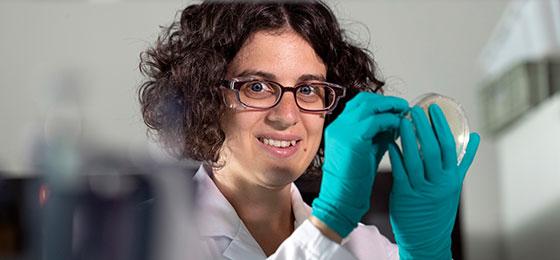Marie Heim-Vögtlin Prize 2018: Sara Montagner discovers the epigenetic secrets of mast cells

Epigenetic modifications of our DNA are a key aspect of the normal functioning of mast cells, which play an important role in immune reactions. Biologist Sara Montagner was able to demonstrate this in her work. She will receive this year’s Marie Heim-Vögtlin Prize from the SNSF at the award ceremony in Bellinzona on 29 November 2018.
Mast cells are white blood cells. As part of the immune system, they play an important role in fighting pathogens by secreting substances such as histamine. Malfunctioning mast cells can cause health problems: if they overreact, they can trigger allergic reactions.
Proven influence of epigenetics
In 2016 and 2017, Sara Montagner investigated epigenetic modifications in mice. These modifications modify the DNA without rearranging its building blocks. With her colleagues, she demonstrated that the ablation of two enzymes (TET2 and DNMT3A) altered the epigenetic modifications in mast cells. She observed that mast cell functions were changed as a result of the missing enzymes: they displayed an increased proliferation and secreted excessive amounts of mediators that trigger immune reactions. These observations prove the fundamental influence of epigenetics on the physiology of mast cells – and therefore on our health.
Supported by the SNSF
Sara Montagner completed this work during her postdoc years at the Institute of Biomedical Research in Bellinzona, funded by a Marie Heim-Vögtlin grant from the SNSF. Thanks to the grant, she had time to look after her young daughter while making her mark as an early-career researcher. She published her results in two journals. Since May 2018, Sara Montagner has held a research position at Novartis in Basel.
She will receive the Marie Heim-Vögtlin Prize of the SNSF, worth 25,000 Swiss francs, in recognition of her achievements. The award ceremony will take place during a conference of the European Academy of Dermatology and Venereology in Bellinzona on 29 November 2018.
Balancing scientific work and family commitments
For 25 years, the SNSF has awarded Marie-Heim Vögtlin grants to outstanding woman researchers who had to reduce or interrupt their research activities due to family commitments. For the duration of a project of one to two years, the grant offers support in balancing a research career and having a family. The MHV Prize is awarded each year to a MHV grantee in recognition of outstanding research and career development. In 2017, the new PRIMA funding scheme replaced the MHV grants.
The prize is named after Marie Heim-Vögtlin, who was the first female student at the medical faculty of the University of Zurich in 1868. She successfully completed her studies and opened a gynaecological practice, which she continued to run after the birth of her two children. She was a pioneer in the struggle to secure access to academic studies for women.
Links
- Programme of award ceremony (PDF)
- TET2 Regulates Mast Cell Differentiation and Proliferation through Catalytic and Noncatalytic Activitieshttp://doi.org/10.1016/j.celrep.2016.04.044
- Dnmt3a restrains mast cell inflammatory responses
- Video
- Picture of Sara Montagner, © SNSF / Severin Nowacki (JPEG)